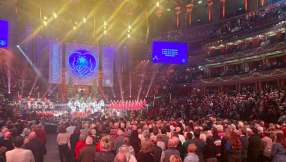Jubilation, lamentation after Church of England vote on women bishops
General Synod, the Church's ruling body, voted on Monday night after a six-hour debate to confirm the process towards the ordination of women bishops but rejected proposals to appoint "super bishops" or new dioceses to cater for objectors.
Synod members instead voted in favour of a statutory code of practice detailing how to accommodate opponents that will be debated at next February's Synod in London.
A group of liberals, Modern Churchpeople's Union, agreed at their annual conference to support the Synod vote.
Jonathan Clatworthy, general secretary of the MCU, said, "This paves the way for equal treatment for women and men through all the layers of the church, without discrimination. We consider this to be of fundamental importance.
"The code of practice has yet to be drawn up and we would urge those charged with the task to protect this vital principle so that the church fully reflects the best insights of the 21st century."
John Plant, chair of the MCU, said that the vote "allows the Church to be inclusive of those who take other views".
"We hope this allows traditional catholics and conservative evangelicals to continue to contribute to the rich diversity of Anglicanism," he said.
The Church of England has ordained women priests since 1994. The Diocese of Oxford has the highest number of women priests, more than 250.
The Bishop of Oxford, the diocese with the most women priests at more than 250, said it was time to "rejoice generously" with them in their ministry.
"They serve with distinction in town and country and can now look forward to women's ministry being honoured without equivocation," said the Rt Rev John Pritchard.
The Bishop acknowledged the "deep pain" felt by traditional catholic and evangelical ministers and added that he would operate a code of practice with "full generosity".
"This is therefore a difficult period for us to negotiate. How do we hold together celebration and lament? Only, I believe, with the gospel of generosity," he said.
"My message again therefore is to rejoice with those who rejoice and weep with those who weep, but to stay close to the Lord whose generosity is all any of us have to rely on, and whose sustaining love is guaranteed."
Conservative group Reform, meanwhile, expressed its disappointment at the vote, saying that Synod had "swept aside" the opinions of senior bishops on the content and timing of the measure.
The group said it would scrutinise the code of practice carefully, "but remain very sceptical as to its usefulness".
"By giving no legal provision Synod has effectively said: 'We don't want people like you in our Church of England.' This message will no doubt further rouse the 'sleeping giant' of orthodox and evangelical Anglicanism in the UK and around the globe," the statement read.
The Archbishop of York, Dr John Sentamu, had given his support for the appointment of "super bishops", whilst the Archbishop of Canterbury, Dr Rowan Williams, said he would have welcomed "a more rather than a less robust" set of measures to accommodate conservatives.
The conservative Bishop of Durham, the Rt Rev Tom Wright, said that the outcome of the Synod debate was "a muddle" and that the debate should have been "pulled".
The vote has dimmed the prospects of achieving unity between Anglicans and the Vatican after years of painstaking dialogue. In a statement on Tuesday, the Vatican Council for the Promotion of Christian Unity said that it had "regretfully" learned of the Church of England's vote.
The Roman Catholic Church opposes women bishops on the basis that Jesus appointed only men to be his apostles.
In a statement released on Tuesday, the Council said: "Such a decision signifies a breaking away from the apostolic tradition maintained by all of the churches since the first millennium and is a further obstacle for reconciliation between the Catholic Church and the Church of England.
"This decision will have consequences on the future of dialogue, which had up until now borne fruit."
The head of the Council, Cardinal Walter Kasper, is expected to reiterate that stance when he attends the Lambeth Conference in Canterbury next week. Around 700 bishops are due to attend.













